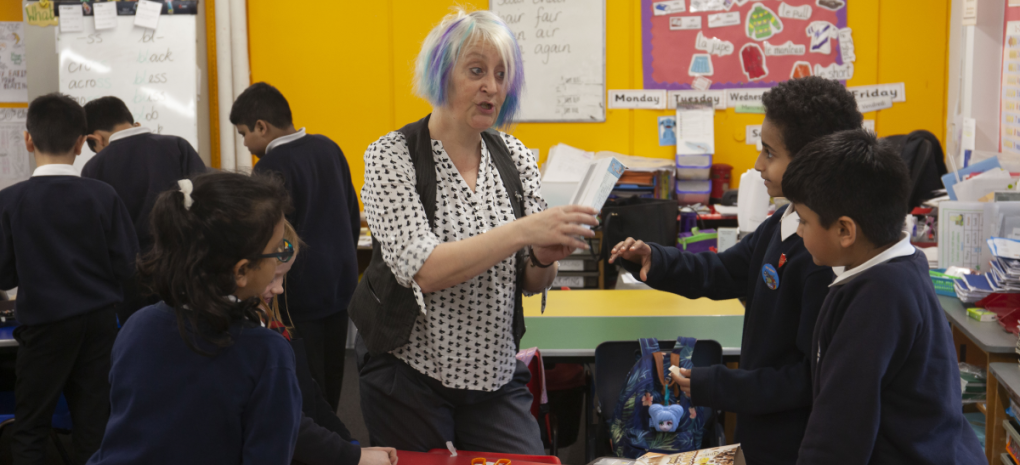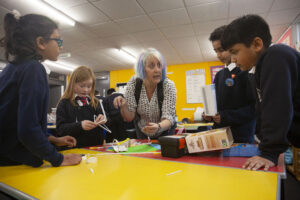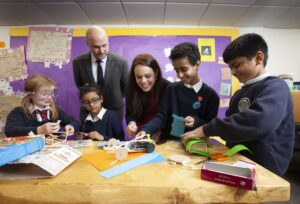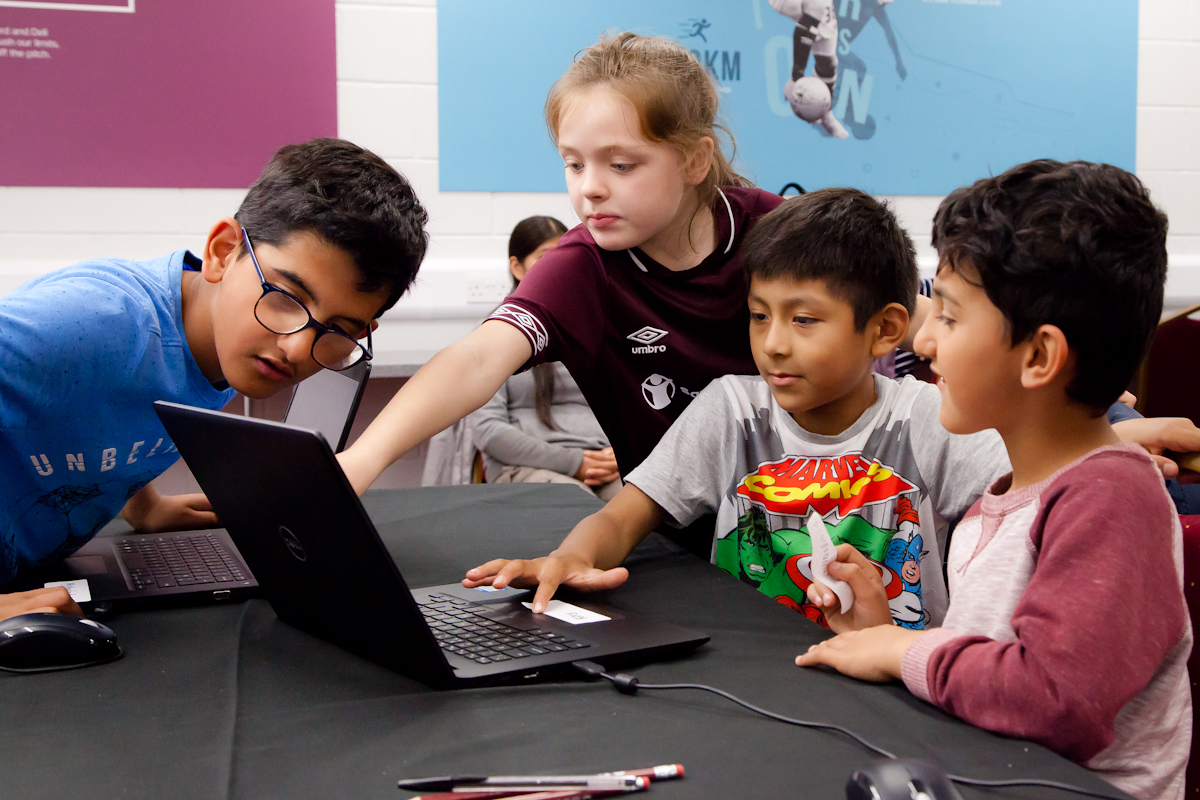Applications now open for sixth round of Grant Awards
![]()
Schools, clubs and activity providers teaching young people innovative digital skills are all encouraged to apply
Funding applications have opened for this year’s grants programme from Digital Xtra Fund, Scotland’s charity committed to increasing the number and diversity of young people learning key digital skills.
Up to £75,000 will be awarded to high quality, exciting extracurricular digital technologies activities across Scotland. Organisations can apply for grants from a minimum of £500 to a maximum of £5,000. Applications are open until 14:00 on 22 April 2021.
The grants programme is open to schools and organisations who encourage young people to learn digital skills through high quality, extracurricular activities, thus inspiring them to study computing science or other digital technology courses and ultimately pursue a career in tech. This year, the grants programme will also include at least two grants focused specifically on cyber security skills funded by the Scottish Government under the cyber resilience strategy.
Applications are welcome from UK-registered companies, charities, chartered bodies, local authorities, schools, colleges, or universities actively involved in the provision of computing education or digital technology related activities, especially for audiences from excluded groups or backgrounds.
Supported activities must be delivered between 1 July 2021 and 30 June 2022 and delivered entirely in Scotland. Activities must also focus on engaging young people aged 16 and under.

Kraig Brown, Partnerships & Development Manager for the Digital Xtra Fund, said: “2020 was a year like no other. The impact of lockdown, home schooling and the mass-adoption of online services, at an unprecedented rate highlighted how integral digital technology has become in our daily lives. It is an essential tool, and we must teach all young people how to effectively and safely use this tool or they risk being left behind.
“The ability to get online or use certain programmes and apps is important, however will these skills be enough? It is imperative we teach young people to also understand and create with technology, not simply use it. We must focus on activities and lessons which teach them skills such as computational thinking, the design process, resilience and, perhaps most importantly, we need to do this in a fun and exciting way to inspire their creativity as well.
“The ability to tailor extracurricular activities makes them an ideal medium to engage young people in tech as was highlighted in the 2020 Scottish Technology Ecosystem Review. Within the Education and Talent stream, the role of extracurricular activities was identified as a key element to widening the talent pipeline.”
 Nicola Gallen, Business Development Manager for Devolved Nations at Amazon Web Services (AWS) EMEA SARL, one of the Fund’s key supporters, added: “AWS is pleased to support Digital Xtra Fund. Having been involved in last year’s application evaluation panel, we saw first-hand the positive impact the grants programme has on schools and educational organisations across Scotland. This year as a Gigabyte Partner, we’re enabling the Fund to support even more fantastic initiatives.
Nicola Gallen, Business Development Manager for Devolved Nations at Amazon Web Services (AWS) EMEA SARL, one of the Fund’s key supporters, added: “AWS is pleased to support Digital Xtra Fund. Having been involved in last year’s application evaluation panel, we saw first-hand the positive impact the grants programme has on schools and educational organisations across Scotland. This year as a Gigabyte Partner, we’re enabling the Fund to support even more fantastic initiatives.
“At AWS we believe that everyone should be involved in building the future and want to inspire as many people as possible to become creators of tech as well as consumers of it. Helping more schools and organisations show young people how exciting tech can be through the Digital Xtra Fund grants programme is something that we’re very proud to be part of.”
Last year, Digital Xtra Fund supported 25 activities across the country including Heart of Midlothian Football Club’s new Innovation Centre. This community-based initiative offers courses to help people learn digital skills as well as supporting local businesses. Funding enabled the delivery of two activities for young people which were initially to be delivered in person, however, the Club was able to successfully pivot to deliver both programmes via remote learning.
 Ann Park, Director of Community and Partnerships at Hearts, said: “It has been great working with Digital Xtra Fund. We have had first-class feedback from our all-girls Apps for Good programme and Building an Online Shop course and are looking forward to running these again in February. Digital Xtra Fund’s support has enabled us to reach young people from a broad range of backgrounds and inspire them to take the next steps in forging a digital career.”
Ann Park, Director of Community and Partnerships at Hearts, said: “It has been great working with Digital Xtra Fund. We have had first-class feedback from our all-girls Apps for Good programme and Building an Online Shop course and are looking forward to running these again in February. Digital Xtra Fund’s support has enabled us to reach young people from a broad range of backgrounds and inspire them to take the next steps in forging a digital career.”
Digital Xtra Fund brings together industry, educators, and the public sector with a common goal of helping young people succeed. The Fund’s grants programme would not be possible without support from its partners. This year’s key partners include AWS, Baillie Gifford, CGI, J.P. Morgan, and Scottish Government as well as Accenture, BT, Cirrus Logic, Incremental Group, Micro:bit Educational Foundation, ScotlandIS, Skills Development Scotland, and Skyscanner.
To find out more about eligibility criteria and to apply visit: https://www.digitalxtrafund.scot/apply/
This year’s grant awards are also dedicated to the memory of Joan Davidson, Head of Learning at Edinburgh Science, who sadly passed away in November 2020. Joan was committed to inspiring young people to explore, study, and develop a lifelong love of STEM and was instrumental in organising events and experiences that reached more than half a million young people.
About Digital Xtra Fund:
 Digital Xtra Fund was launched in May 2016 to support extracurricular activities which boost interest in computing and technology among young people and provide them a clearer understanding of the types and range of careers in tech. In March 2017, the Fund became a Scottish Charitable Incorporated Organisation (SCIO) enabling it to partner with a wide range of industry partners. Since its inception, the Fund has awarded £660,000 to 80 initiatives across the country and helped engage over 38,000 young people in technology. Many supported activities include schools and small grassroots organisations. Summaries of all previous initiatives and activities supported by the Fund can be found under the Grants tab on the Digital Xtra Fund website.
Digital Xtra Fund was launched in May 2016 to support extracurricular activities which boost interest in computing and technology among young people and provide them a clearer understanding of the types and range of careers in tech. In March 2017, the Fund became a Scottish Charitable Incorporated Organisation (SCIO) enabling it to partner with a wide range of industry partners. Since its inception, the Fund has awarded £660,000 to 80 initiatives across the country and helped engage over 38,000 young people in technology. Many supported activities include schools and small grassroots organisations. Summaries of all previous initiatives and activities supported by the Fund can be found under the Grants tab on the Digital Xtra Fund website.
The goal of Digital Xtra Fund is for every young person in Scotland to have access to innovative and creative digital making activities regardless of gender, background, or where they live, and understand the range of careers these skills will provide. The aims of Digital Xtra Fund are to:
- inspire young people to understand and create with technology, not simply use it
- enable exciting extracurricular digital tech activities across Scotland
- engage industry experts with young people to help contextualise digital skills




 “
“





 If this approach is to succeed, he concedes, it will need support from the very top.
If this approach is to succeed, he concedes, it will need support from the very top.

 This announcement comes hot on the heels of The Scottish Government’s ‘Report on STEM in early years of education’ which found that gender imbalances and disadvantages from living in areas of deprivation or rural isolation are creating serious barriers to engaging young people in STEM (Science, Technology, Engineering, Maths). It also highlights that systemic change is required to overcome these barriers and an increased focus on long-term interventions in school and early learning settings – including through extracurricular activities. Digital Xtra Fund emphasises awarding grants for initiatives that target girls and young women or are delivered in areas of high deprivation or rural settings.
This announcement comes hot on the heels of The Scottish Government’s ‘Report on STEM in early years of education’ which found that gender imbalances and disadvantages from living in areas of deprivation or rural isolation are creating serious barriers to engaging young people in STEM (Science, Technology, Engineering, Maths). It also highlights that systemic change is required to overcome these barriers and an increased focus on long-term interventions in school and early learning settings – including through extracurricular activities. Digital Xtra Fund emphasises awarding grants for initiatives that target girls and young women or are delivered in areas of high deprivation or rural settings.


 “There isn’t always an option for young people to learn advanced digital skills at school, and this is why our funding is so important, as it opens up additional opportunities for young people across a wide range of backgrounds.
“There isn’t always an option for young people to learn advanced digital skills at school, and this is why our funding is so important, as it opens up additional opportunities for young people across a wide range of backgrounds. Speaking at today’s announcement of the 22 recipients for 2019, the Minister said, “Technology is fundamental to young people’s lives and having digital skills opens up so many opportunities. We want to build a nation where all young people are comfortable using technology whatever their background. Digital Xtra Fund is a great example of different organisations working together to realise these ambitions. I look forward to seeing the initiatives supported by Digital Xtra Fund develop and I’m certain that they will help inspire the next generation of digital experts.”
Speaking at today’s announcement of the 22 recipients for 2019, the Minister said, “Technology is fundamental to young people’s lives and having digital skills opens up so many opportunities. We want to build a nation where all young people are comfortable using technology whatever their background. Digital Xtra Fund is a great example of different organisations working together to realise these ambitions. I look forward to seeing the initiatives supported by Digital Xtra Fund develop and I’m certain that they will help inspire the next generation of digital experts.” Digital Xtra Fund brings together businesses, organisations, and individuals with a common will to help young people succeed in a digital world through an annual grant awards programme. Key Partners include J.P. Morgan, Skills Development Scotland, Skyscanner, and the Scottish Government, as well as Accenture, Baillie Gifford, BT Scotland, CityFibre, Fujitsu, Incremental Group, Micro:bit Educational Foundation, Microsoft, ScotlandIS, Sky UK, and Zonal.
Digital Xtra Fund brings together businesses, organisations, and individuals with a common will to help young people succeed in a digital world through an annual grant awards programme. Key Partners include J.P. Morgan, Skills Development Scotland, Skyscanner, and the Scottish Government, as well as Accenture, Baillie Gifford, BT Scotland, CityFibre, Fujitsu, Incremental Group, Micro:bit Educational Foundation, Microsoft, ScotlandIS, Sky UK, and Zonal.
 On 30 August, Digital Xtra Fund will launch its next round of funding with a total of £75,000 available. Grants of up to £5,000 will be awarded to extracurricular activity providers that teach skills such as coding, data science, and computational thinking and help inspire Scotland’s next generation of designers, developers, and digital technologists.
On 30 August, Digital Xtra Fund will launch its next round of funding with a total of £75,000 available. Grants of up to £5,000 will be awarded to extracurricular activity providers that teach skills such as coding, data science, and computational thinking and help inspire Scotland’s next generation of designers, developers, and digital technologists.
 Digital Xtra Fund brings together businesses, organisations, and individuals with a common will to help young people succeed in a digital world through an annual grant awards programme. Key Partners include
Digital Xtra Fund brings together businesses, organisations, and individuals with a common will to help young people succeed in a digital world through an annual grant awards programme. Key Partners include 